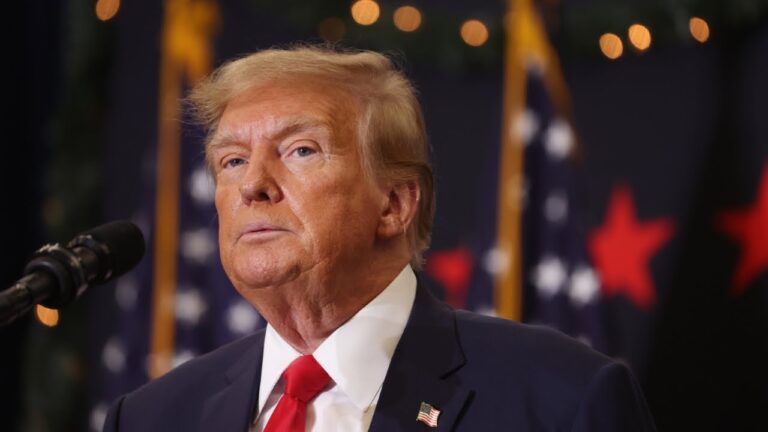In a bold legal move, former President Donald Trump is set to file a $100 million lawsuit against the United States Department of Justice (DOJ) over the unprecedented FBI raid on his Mar-a-Lago residence in Palm Beach, Florida. This action comes in the wake of the DOJ’s investigation into Trump’s alleged improper retention of classified records and the subsequent indictment brought against him by Special Counsel Jack Smith.
Alleged Violations of Constitutional Principles and Established Protocols
Trump’s legal team, led by attorney Daniel Epstein, has accused the DOJ and the FBI of blatantly disregarding established protocols and violating constitutional principles in their handling of the Mar-a-Lago raid. Epstein argues that the decisions made by Attorney General Merrick Garland and FBI Director Christopher Wray were not grounded in sound law enforcement practices, but rather driven by a “clear intent to engage in political persecution” against Trump.
Epstein contends that the DOJ and FBI failed to adhere to the well-established protocol for dealing with former U.S. presidents, which typically involves obtaining consent and cooperation from the individual, rather than resorting to a raid. He asserts that Garland and Wray should have sought Trump’s consent, notified his lawyers, and attempted to cooperate with him to obtain the records in question, rather than executing the unprecedented and highly intrusive raid.
The lawsuit also alleges that the FBI’s actions during the raid constitute a severe and unacceptable intrusion into Trump’s private quarters at Mar-a-Lago, a violation of his right to privacy. Epstein argues that the FBI’s conduct was “inconsistent with protocols used in routine searches of an investigative target’s premises” and that Trump “had a clear expectation of privacy at Mar-a-Lago.”
Unlawful Prosecution and Abuse of Process
In addition to the alleged privacy violations, the lawsuit contends that the DOJ and the Special Counsel’s office brought a “lawless criminal indictment” against Trump, which was not grounded in constitutional principles. Epstein points to the Supreme Court’s ruling that a president has immunity from prosecution for official acts, arguing that there was no valid legal basis for the search or the subsequent indictment.
Furthermore, the lawsuit alleges an “abuse of process,” claiming that the legal proceedings against Trump were “unconstitutional and aimed at politically persecuting the former President,” leading to extensive legal costs and negative consequences for him.
Damages and Punitive Measures
Epstein’s filing states that the DOJ’s “malicious prosecution and abuse of process” have caused Trump to incur approximately $15 million in legal costs while defending himself against Smith’s case. As a result, the lawsuit seeks not only compensatory damages but also punitive damages of $100 million, arguing that the respondents must be held accountable for the harms inflicted upon Trump
Implications and Broader Context
The lawsuit filed by Trump and his legal team is seen as a direct challenge to the DOJ’s actions and an attempt to hold the government accountable for what they perceive as a politically motivated and unconstitutional pursuit of Trump. Epstein has emphasized that this case is not just about Trump, but about “standing up for all Americans who believe in the rule of law and believe that you should hold the government accountable when it wrongs you.”
Supreme Court Rulings and Dismissal of Smith’s Case
The lawsuit also references two significant legal developments that have bolstered Trump’s position. Firstly, the Supreme Court’s ruling that a president has substantial immunity from prosecution for official acts, which Epstein argues undermines the legal basis for the DOJ’s actions. Secondly, the dismissal of Smith’s case against Trump by U.S. District Judge Aileen Cannon, who ruled that the Special Counsel’s appointment and funding were unconstitutional.
Potential Outcomes and Implications
The outcome of this lawsuit could have far-reaching implications, not only for Trump but also for the broader relationship between the executive branch and the DOJ. A successful lawsuit could set a precedent for holding government agencies accountable for alleged political persecution and abuse of power, while a dismissal of the case could further embolden the DOJ’s pursuit of Trump.
Ongoing Investigations and Potential Escalation
It is worth noting that the DOJ’s investigation into Trump’s handling of classified documents is ongoing, and Trump’s legal team has indicated that this lawsuit is just the beginning of their efforts to challenge the government’s actions. As the legal battle continues to unfold, the public and the political landscape will closely follow the developments, with the potential for further escalation and legal maneuvering.




Leave a Comment